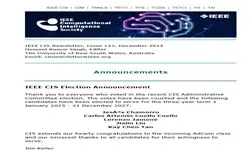-
Members: FreeCIS
IEEE Members: Free
Non-members: FreeLength: 00:52:11
16 Apr 2013
Abstract: In this presentation, we introduce a certain concept of evolving fuzzy rule-based models and elaborate on their design by engaging ideas of Granular Computing.
We develop a rule-based model whose design predominantly uses a direction-sensitive fuzzy clustering. In the sequel, the quality of such fuzzy models is quantified by admitting their generalization in the form of granular fuzzy models. Altogether, the signature of the fuzzy model is composed of the parameters of information granules forming the rules and positioned in the input and output space. It is shown how an evolution of the fuzzy model being formed in successive temporal windows can be described in terms of the dynamics of its signature (underlying information granules), which in turn may lead to the construct similar to the Kalman filter.
When evolving granular fuzzy models, discussed are a number of essential development issues: (a) coping with a variable input space, (b) handling adjustable level of granularity (number of rules) required in each temporal window leading to splitting or merging clusters and their subsequent adjustment, (c) formalizing fuzzy temporal time windows.
We develop a rule-based model whose design predominantly uses a direction-sensitive fuzzy clustering. In the sequel, the quality of such fuzzy models is quantified by admitting their generalization in the form of granular fuzzy models. Altogether, the signature of the fuzzy model is composed of the parameters of information granules forming the rules and positioned in the input and output space. It is shown how an evolution of the fuzzy model being formed in successive temporal windows can be described in terms of the dynamics of its signature (underlying information granules), which in turn may lead to the construct similar to the Kalman filter.
When evolving granular fuzzy models, discussed are a number of essential development issues: (a) coping with a variable input space, (b) handling adjustable level of granularity (number of rules) required in each temporal window leading to splitting or merging clusters and their subsequent adjustment, (c) formalizing fuzzy temporal time windows.


